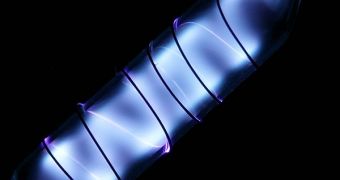A baby born recently at the Royal United Hospital, in Bath, has become the first infant in medical history to benefit from a newly developed therapy aimed at reducing brain damage. More than 1,000 children born in the United Kingdom every year tend to suffer brain damage, or even lose their lives, on account of complications that occur at birth, such as inadequate oxygen and blood supplies. The new therapy, which uses xenon gas to “cool” the babies, was developed to prevent brain injury.
Statistics show that there is a 50:50 chance for children born with these complications to suffer from partial or extensive brain damage, so the treatment comes as a breath of fresh air. When he was delivered via emergency Cesarean section (C-section), Riley Joyce was not breathing, and had no pulse. His faith might have been similar to that of all the babies in the aforementioned population subgroup, but his parents agreed to trying the new course of treatment. Now, Riley is doing alright, more than a week after being subjected to the action of xenon, the BBC News reports.
The treatment was administered to him at St Michael's Hospital, in Bristol. It was developed in a cooperation between University of Bristol Professor of Neonatal Neuroscience Marianne Thoreson and Swansea University School of Medicine consultant anesthetist Dr. John Dingley. “After seven days, Riley was alert, able to look at his mother's face, hold up his head and begin to take milk,” the UB expert says. Thoreson has been working on therapies meant to reduce brain damage in infants for about 12 years, and she pioneered the technique of colling the babies after birth.
“Over the past eight years, we have shown in the laboratory that xenon doubles the protective effect of cooling on the brain. However we faced the challenge of how to safely and effectively deliver this rare and extremely expensive gas to newborn babies,” the professor adds. “A key design feature of this machine is that it is very efficient, using less than 200ml of xenon per hour – less than the volume of a soft drinks can. Xenon is a precious and finite resource and difficult to extract so it can cost up to £30 a liter. As ventilated newborns breathe many liters of air per minute, any xenon-based treatment would be impossibly expensive without an economical delivery method,” Dingley, who invented the device, says.

 14 DAY TRIAL //
14 DAY TRIAL //